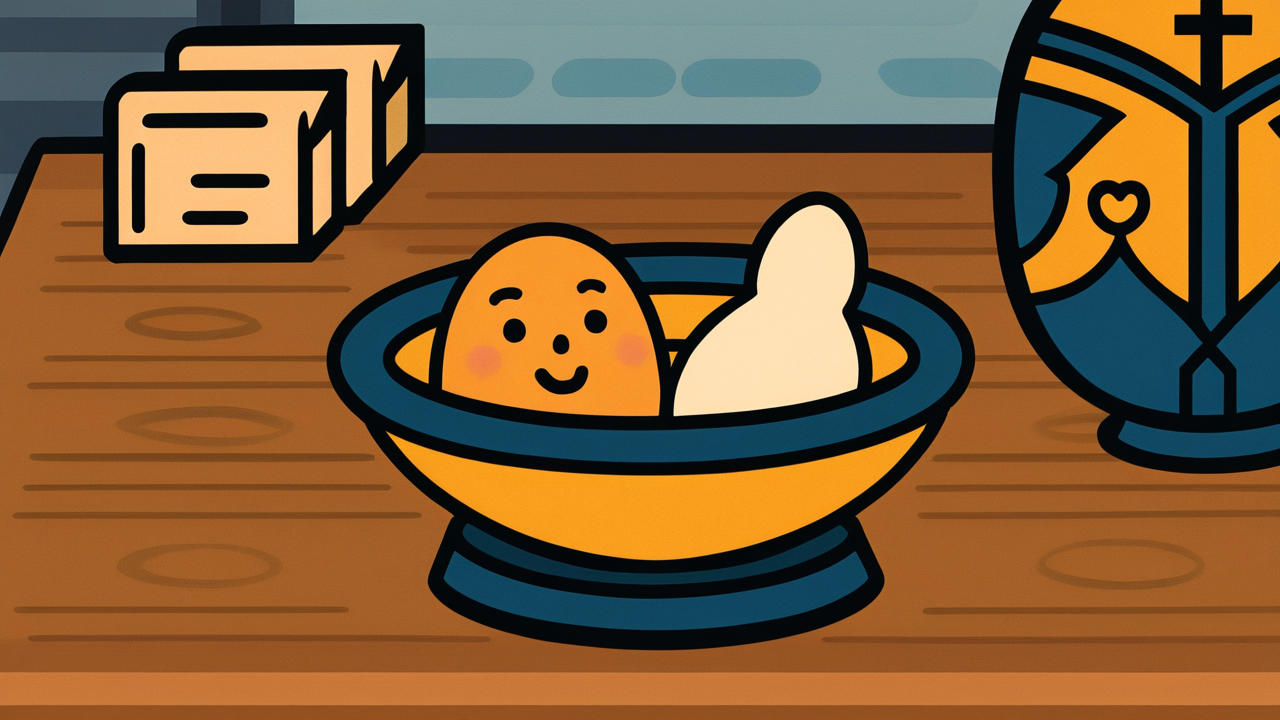How to Read “コロンブスの卵”
koronbusu no tamago
Meaning of “コロンブスの卵”
“Columbus’s egg” means that even though something may appear to be simple and achievable by anyone, being the first to conceive and execute it is extremely difficult and valuable.
This proverb is used to express the value of coming up with innovative ideas, inventions, and new methods. It teaches us that even things that seem obvious in hindsight require courage, creativity, and execution power to take the first step in unprecedented situations. It is particularly often used in contexts that defend creators and inventors who face criticism or negative opinions. Even today, it is used to evaluate the pioneering nature and originality of new business models, technological innovations, and artistic works when they tend to be dismissed as “anyone could think of that.”
Origin and Etymology
“Columbus’s egg” is a proverb that originated from an anecdote about the 15th-century explorer Christopher Columbus. According to the commonly known established theory, it stems from an incident that occurred when Columbus was criticized at a banquet after discovering the Americas, with people saying “anyone could have done it.”
At that time, Columbus pointed to an egg on the table and challenged the people, saying “Please try to make this egg stand up.” When no one could make the egg stand, Columbus lightly cracked the bottom of the egg to flatten it and successfully made it stand. He then explained, “Once you know the method, it seems simple, but thinking of it first is what’s important.”
This anecdote was recorded in the works of 16th-century Italian art historian Giorgio Vasari and was introduced to Japan through Western literature from the Meiji period onward. In reality, similar stories are said to have existed since ancient Roman times, and before Columbus, they were apparently told about other figures such as the architect Brunelleschi. However, the Columbus version, which was associated with the great achievement of discovering the New World, became the most famous and has been passed down to the present day.
Usage Examples
- That groundbreaking app is now Columbus’s egg, but the person who first created it was amazing
- Her proposal may seem simple, but it’s truly Columbus’s egg, hitting a blind spot that no one noticed
Modern Interpretation
In modern society, the meaning of “Columbus’s egg” has become more multi-layered. In the information age, there is a tendency for the value of ideas and the value of execution to be separated, which also affects the interpretation of this proverb.
With the spread of social media and the internet, criticism saying “anyone could think of that” is heard more frequently than before. When new services or apps appear, voices immediately arise saying “this is simple” or “I could make this myself.” However, in reality, the path to realizing an idea—including technical implementation, market launch, and user acquisition—is complex and difficult.
On the other hand, in modern times, sharing information has become easier, so it’s not uncommon for multiple people to come up with similar ideas at the same time. This makes it difficult to identify “the person who thought of it first,” making the concept of “the sole inventor,” which is the premise of the proverb, ambiguous.
Furthermore, with the development of open-source and collaboration culture, there are increasing situations where team creativity and improvement of existing ideas are valued more than individual originality. In such environments, continuous improvement and collective intelligence often hold more value than “Columbus’s egg”-type individual flashes of inspiration.
When AI Hears This
The story of “Columbus’s Egg” was actually a tale created by the 16th-century Italian writer Benzoni. The real Columbus was famous for a completely different anecdote, where he supposedly pointed to a world map at a banquet and prophetically declared, “There is a new continent here.”
What makes this “false origin” fascinating is the reason it was created. In the 16th century, Italians wanted to reclaim Columbus (who was Italian-born) whose achievements had been claimed by the Spanish. So they invented the egg-standing story to create an image of a “quick-witted Italian.”
Even more intriguing is how this fabricated story has evolved over time. Originally it was a tale about “clever wit that silences critics,” but today it’s used to mean “a shift in perspective.” In other words, the fake story has undergone further transformation.
This resembles how information spreads on modern social media. For example, there’s the phenomenon where someone’s statement changes slightly each time it’s quoted, eventually becoming a message completely different from the original meaning.
The irony is that a proverb teaching us to “question common sense” is itself common sense that should be questioned. Perhaps every time we use “Columbus’s Egg,” we’re unknowingly putting this very lesson into practice.
Lessons for Today
What “Columbus’s egg” teaches modern people is that true value lies in simple solutions. In our complex modern society, we tend to overthink things, but truly excellent ideas are often surprisingly simple.
What’s important is believing in the value of your own ideas without being swayed by others’ criticism. Even if people say “anyone could do it,” you were the one who actually executed it first. In today’s social media society, critical voices tend to sound loud, but we must not forget that evaluation with hindsight and challenges in unknown territory are completely different things.
This proverb also teaches the importance of humility. What you think is obvious might be a groundbreaking idea for others. Conversely, before dismissing others’ achievements as “easy,” we should have an attitude that recognizes the effort and insight behind them. Creativity is born from the courage to question existing frameworks and provide new perspectives.



Comments